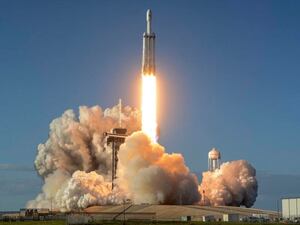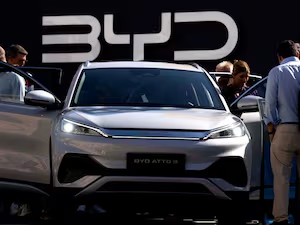SpaceX’s Falcon Heavy rocket takes off for first commercial flight
It comes a year after an initial test flight.

SpaceX has launched the world’s most powerful rocket on its first commercial mission.
The new and improved Falcon Heavy thundered into the early evening sky on Thursday with a communication satellite called Arabsat, the rocket’s first paying customer.
The core booster landed two minutes later on an ocean platform hundreds of miles offshore – the only part of the first mission that missed.
“What an amazing day,” a SpaceX flight commentator exclaimed. “Three for three boosters today on Falcon Heavy, what an amazing accomplishment.”
The Falcon Heavy soared from the space centre using the same pad that shot Apollo astronauts to the moon half a century ago and later space shuttle crews.
Nearby beaches and other prime viewing spots were packed with tourists and locals eager to catch not just the launch but the rare and dramatic return of twin boosters, accompanied by sonic booms.
The roads were also jammed for Wednesday night’s launch attempt, which was scuttled by high wind.
Because this was an upgraded version of the rocket with unproven changes, SpaceX chief Elon Musk cautioned in advance things could go wrong.
But everything went well and the satellite ended up in the proper orbit.
SpaceX employees at company headquarters in Southern California cheered every launch milestone and especially the three touchdowns.
“The Falcons have landed,” Mr Musk said in a tweet that included pictures of all three boosters.
NASA offered swift congratulations.
“From our iconic launch pads at @NASAKennedy, we will continue to support the growing commercial space economy,” NASA tweeted.
The launch comes a year after Mr Musk put his own Tesla convertible on the initial test flight.
The red Roadster — with a mannequin, dubbed Starman, likely still at the wheel — remains in a solar orbit stretching just past Mars.
SpaceX plans to launch its next Falcon Heavy later this year on a mission for the US Air Force. The boosters for that flight may be recycled from this one.
NASA administrator Jim Bridenstine last month suggested possibly using a Falcon Heavy — and another company’s big rocket — to get the space agency’s Orion capsule around the moon, minus a crew, in 2020.
But the preferred method remains NASA’s own Space Launch System mega rocket — if it can be ready by then.
SpaceX typically launches Falcon 9 rockets. The Falcon Heavy is essentially three of those single rockets strapped together.
Until SpaceX came along, boosters were discarded in the ocean after satellite launches. The company is intent on driving down launch costs by recycling rocket parts.





